Preventive Dentistry
Re-posted with the permission of Perio Protect.
With the outbreak of the coronavirus, treatment for inflammation and prevention of infection and disease is more important than ever. The human body can only handle so much inflammation, and the healthier a person is – the less chronic inflammation taxing the body – the easier it is to fight off other infections, including viral. This is why we take any infectious oral conditions, even asymptomatic gum disease, so seriously. Brushing, flossing and homecare may seem mundane, but so is washing your hands. These “mundane” acts can help keep you healthy.
Our office prescribes Perio Protect, a homecare system to prevent and treat gum disease. Special prescription trays, called Perio Trays®, are made just for your mouth to deliver medication deep below the gums to fight infections causing disease. The primary medication applied with the trays, Perio Gel® with 1.7% hydrogen peroxide, is highly effective at killing infectious bacteria and reducing inflammation.
Peroxide also kills the coronavirus. Using peroxide in these special prescription trays will not prevent you from contracting the virus, but the peroxide therapy, rinsing with peroxide or brushing with the peroxide gel may help reduce the viral load in saliva and the risk of oral transmission. For this reason, dentists may ask you to pretreat with a peroxide product before coming to the dental office.
Maintain A Healthy Smile and a Healthier Immune System
It has never been more important to keep your gums healthy. Gum health is key to keeping your teeth for a lifetime and important for a healthy immune system. The chronic inflammation from infected gums is also associated with arterial inflammation, heart disease, stroke, dementia and uncontrolled diabetes. For patients with these illnesses, it is especially important to see our dental team.
If you have been told that you have gum disease or if you are concerned about bleeding gums or chronic bad breath, both symptoms of infected gums, be sure to schedule an appointment. We believe that informed patients will make informed decisions. Be sure to contact us to discuss your concerns.

The Fascinating Tongue
Our tongues may not seem that fascinating, but to your dentist in Sparks, these muscles are actually quite interesting and important. Not only are our tongues one of the strongest muscles in our bodies, but they also help us do many useful, everyday tasks such as speak, chew, and swallow. Tongues also have about 10,000 taste buds that allow us to taste every bit of our favorite foods. But these taste buds are also really great places for bacteria to hide. If those bacteria are not removed regularly, they can start to negatively affect oral health.
What Happens if You Don’t Brush Your Tongue?
Our tongues are made up of tons of tiny bumps called papillae. These papillae create peaks and valleys on our tongues and give bacteria the perfect place to settle. If the bacteria aren’t removed, you may experience some unwanted side effects. Let’s take a look at a few.
- Bad Breath – One of the most common side effects of not brushing your tongue is bad breath. While bad breath can be caused by a lot of different things, an unclean tongue can be to blame.
- Decreased Sense of Taste – Everyone loves to eat their favorite foods because they taste good. But when a tongue is not properly cared for, bacteria can coat our taste buds and decrease our sense of taste. This means that our favorite foods may not taste quite as good as they once did.
- Black, Hairy Tongue – Even though this sounds scary and gross, black, hairy tongue is a very real thing that can occur from not brushing your tongue. This discoloration happens when food and drink particles aren’t removed from the surface of the tongue and essentially stain those tiny papillae. It should go away on its own once you get into the tongue-brushing habit.
- Gum Disease – Since our tongues are in contact with our teeth throughout the day, everything on our tongues can easily transfer onto our teeth. When tongue bacteria move to the teeth, it can cause decay and, if left untreated, progress into gum disease. Gum disease is a serious oral health condition that can cause tooth loss if not treated.
How Do You Clean Your Tongue?
It’s important to brush your tongue every time you brush your teeth. This will give you the cleanest mouth. You don’t need to scrub your tongue hard, and truth be told you shouldn’t. A gentle brushing from the back of the tongue to the front and from side-to-side will do just fine. However, patients with a strong gag reflex may have trouble with this method. If this is the case, try using a tongue scraper that you can buy at any pharmacy. It’s just as effective as brushing but may not trigger the gag reflex as much as a toothbrush.
Brushing your tongue is a crucial step in making sure you’re caring for your overall oral health as well as possible. Of course, seeing your dentist in Sparks at least every six months is also necessary.
Re-posted with the permission of Perio Protect.

A recent study published in the Postgraduate Medical Journal revealed that certain high-risk bacteria found in gum disease can be a contributing cause of arterial inflammation. And since gum disease affects most Americans over the age of 30—and is both preventable and treatable—the information found in this BaleDoneen study could literally save lives.
You can have your dentist perform a simple, painless exam to see if you have signs of gum disease, and there are several companies that can measure for high-risk oral bacteria. Some include OralDNA, Hain Diagnostic and PerioDX.
There are ways to help treat this high-risk bacteria, including more frequent dental cleanings, usually 4 times each year. At home between dental visits, patients can use prescription Perio Trays® to deliver hydrogen peroxide deep below the gum line. It’s easy, effective, comfortable and convenient..
If you have periodontal disease or are at high risk of gum disease, there are steps you can take to strengthen your oral health, including:
- Brushing and flossing twice a day.
- Stopping smoking.
- Getting a dental cleaning every 3 months.
- Using Perio Trays from Perio Protect.
A professional dental exam, some testing and a few extra minutes taking care of your teeth and gums can make a huge difference. Not only will your mouth thank you, but your heart will as well.
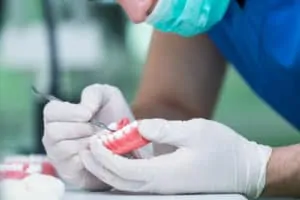
How to Properly Care for Dentures
Even though dentures are not natural teeth, that doesn’t mean they don’t still need a little TLC in order to keep them clean and fitting comfortably.
- Use Care When Handling. Dentures can be pretty fragile, so the first step to caring for them is to make sure you use care when handling them and cleaning them. Also, make sure to store your dentures in a safe place where they won’t easily get knocked on the floor. Being gentle with your dentures can reduce the risk of damage or the need for repairs.
- Rinse Them After Eating. Remove your dentures and thoroughly rinse them following every meal to remove any loose food particles. If leftover food is left lingering around it can contribute to bad breath and even gum disease.
- Brush Your Dentures & Your Mouth. It’s important to brush both your dentures and your mouth at least once daily to remove any bacteria buildup. Use a soft-bristled toothbrush and a denture cleaner to thoroughly cleanse your denture and remove any excess adhesive. As for your mouth, also use a soft-bristled brush to gently scrub any natural teeth and your tongue.
- Soak Your Dentures Every Night. In order to keep their shape and comfortably fit your mouth, dentures need to stay moist. After you remove your dentures and clean them at night, place them in a glass of water with a denture solution to soak. Your dentist in Sparks will be able to recommend a solution that’s best for you.
- Rinse Again in the Morning. You should thoroughly rinse your dentures before putting them back in your mouth after soaking, especially if you use a denture-soaking solution. While these solutions are good for denture care, they can lead to illness or burns if not rinsed off of a denture before it’s reinserted.
- See Your Dentist in Sparks. Seeing your dentist as often as recommended is key to keeping your dentures fitting well. Your dental team may also professionally clean your dentures for an ultra-thorough clean.
Dentures are an investment in your smile, and you want to take proper care of them so they last a long time and the rest of your mouth stays healthy. If dentures aren’t cared for properly, plaque can build up and cause additional tooth loss, bad breath, and even gum disease.
If you’re missing some teeth and think dentures may be right for you, call our dental office in Sparks to schedule a consultation. We’ll work with you to find the best tooth replacement option for you.
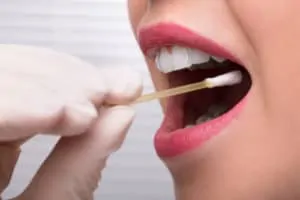
25,000 Quarts of What?
In your lifetime, you’ll produce an average of 25,000 quarts of spit. That’s enough saliva to fill a standard size swimming pool. But why do we need so much spit? We’re glad you asked.
Spit is an extremely important part of a healthy mouth as it helps remove food particles that may linger around after a meal. This is key to protecting teeth against dangerous bacteria that just love to feed on leftovers. The more spit we produce, the more food is rinsed away, and the better protected your teeth are. Spit’s superpowers don’t end there. Saliva can also help neutralize plaque acid, which can protect your pearly whites from decay.
Not Enough
There are times when you may not be producing enough spit. If this is the case, you probably feel as if your mouth is always dry, no matter what you do. Don’t ignore this symptom – call your Sparks dentist as soon as you can. A dry mouth is a serious problem that can increase the risk of decay since there’s not enough saliva to wash away food and bacteria and neutralize acids. Talk with your dentist to find out what may be causing your dry mouth and work together to find the best solution.
Spit and Overall Health
Spit’s benefits reach beyond oral health alone. Spit can help find bone marrow donor matches to help those with blood cancers. Unfortunately, the prevalence of blood cancers is extremely high, and every three minutes someone in the U.S. is diagnosed with blood cancer. This makes bone marrow really important. But patients can’t use just any bone marrow. There has to be a match. BeTheMatch.org is an organization that encourages people to join the bone marrow registry by simply swabbing the inside of the cheek and submitting it to their library where they’ll scan the registry to help find matches for patients. Who knew something so simple could help save a life?
Even though your dentist in Sparks may be more used to spit than you are, and while it may be a little gross, try to remember just how important it is for oral health and how it can help someone battling a very serious and very scary disease.

We’re here to remind you…it doesn’t matter if it’s been a few months or even a few decades since your last trip to the dentist. You have nothing to be afraid of or feel anxious about. We’re here to tell you why and show you how you can feel better fast.
Tip #1 – Take Your Comfort Seriously
We understand how uncomfortable it can be to have severe dental anxiety. It’s downright debilitating for you and your smile. Your Sparks dentist will tell you that you deserve so much better! There’s a sense of calm and relaxation in everything we do. You’ll feel assured and soothed, maybe even pampered during your dental visits.
Tip #2 – Don’t Avoid Your Appointments Out of Fear
Meeting a patient of any age who is afraid of the dentist is always disheartening. Whether they have fear because of a traumatic dental experience in the past or because they don’t like doctors, we believe every patient should feel happy and worthy of a beautiful, healthy smile.
So many times, we meet patients with loose teeth, missing teeth, bleeding gums, bad breath, and more. They’re usually experiencing these issues due to untreated dental problems. The good news is, we can get you out of pain fast and fix your smile back to perfection.
Tip #3 – Know You’re Not Alone – Ever
From the moment you walk in the door to our state-of-the-art office, you’ll have someone with you, a partner who cares about your comfort. This is especially true for our most fearful or anxious patients. That’s why it’s important to discuss your worries with us before your visit, so we can be prepared to pamper you with relaxation.
Like we’ve said before, you’re not alone if you don’t like going to the dentist! The Cleveland Clinic says between 9% and 15% of Americans say they avoid going to the dentist because of anxiety or fear. Does this hit close to home for you or someone in your family? As your appointment approaches, so does the feeling of anxiety or uneasiness. Maybe your heart races and your palms begin to sweat. While this sounds like the beginning of a spooky story, we know it’s all too real for patients who are afraid of seeing the dentist.
Patients who are afraid of or anxious about getting the dental care they need are some of our most treasured patients. We’ve seen how the most fearful patient can transform into one of our best dental patients in terms of keeping up with regular checkups and cleanings.
If there’s something we can do for you to make visiting our Sparks dental office a more relaxing experience, we hope you’ll share it with us. It could make a huge impact on your life or someone else’s! Don’t hesitate to reach out to us online or by phone with questions about your oral and overall health.

These little bite-sized treats are tricky because you think you can have one and just be done. You give in to your cravings and then “BOOM” the next thing you know there are wrappers everywhere and an empty bag to boot. We tried these three easy tips to help stop you from wanting to indulge in everything sugary and sweet, and they actually worked.
Step #1 – Drink Water (Lots of It)
We’re sure you’ve been told somewhere along the way, sometime in your life about the importance of drinking enough water daily. The key is staying hydrated so that your body can function optimally and maintain a proper eating or digestive routine. If you’re craving something sweet, don’t be tempted to reach for an energy drink or a sports beverage. They’re not healthy (like they labels might lead to you believe), and they contain sugar that sticks to teeth and leads to decay.
While opinions differ about how much water a person should consume each day, there’s a little handy, dandy trick called the 8×8 rule you can use. Most health authorities suggest drinking eight, 8-ounce glasses of water daily, or 8×8! (This is equivalent to about two liters or half a gallon).
Step #2 – Eat Healthy
Cravings for sugar are different than your body telling you it’s hungry. It’s your brain playing a little trick on you compared to when you need to refuel for energy, and your body says it’s hungry. Your mind wants you to eat the sugary treat because you’ll feel a release of dopamine as part of your body’s “reward system.” Try to opt for healthy snacks such as fruits and veggies. Go ahead and eat a meal that’s rich with protein, which is excellent for helping to curb cravings and hunger.
We understand that eating real, healthy food isn’t the same as diving into that bag of candies or indulging in that cupcake. But your body (and your smile) will surely thank you for making the right choices now, so they’re there for you in the long run.
Step #3 – Get Enough Sleep
Your Sparks dentist will be the first one to tell you how important sleep is in our lives. It does make a difference in both your oral and overall health. Sleep loss can dramatically change the timing and release of certain hormones responsible for controlling your appetite. When you’re deprived of a good night’s sleep (especially regularly), these hormones get released in larger amounts. Your stomach also releases the hormone that makes you feel full in smaller amounts, causing a perfect storm for cravings and binge on sweets.
What’s more interesting is this: studies show that we change what kinds of foods we purchase when we’re overly tired, too! Researchers found that an increase in hormone levels contributed to us wanting to buy foods that are high in calories and sugar. Both our bodies and brains crave the rewards of unhealthy foods when we get less than seven hours of sleep each night.
We hope you’ll give these three steps a shot, whether it’s on a small or even a bigger level. We know how hard it can be to say no to sweets, no matter what age you are. This time of year, with all of the added pressure, is an excellent opportunity for you to use these tools discussed here to keep your body and your smile healthy. If you have any questions about these tips or would like to know more about how to take care of your teeth, email or give our Sparks dental office a call!
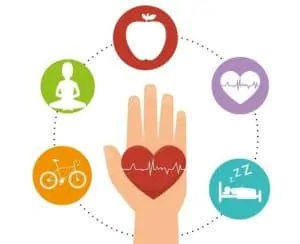
Tip #1 – Keep Your Gums Healthy
There’s a reason why this is number one! Your gum health is so critically important to the rest of your body. According to the Mayo Clinic, recent studies are revealing new evidence that oral bacteria and inflammation due to gum disease are related to a variety of health issues. They include:
– Diabetes
– Low Birth Weight
– Premature Births
– Alzheimer’s Disease
– Stroke
Tip #2 – Keep Plaque from Attacking Your Teeth
There’s a good chance that if you tested your mouth right now, there would be about 500 different types of bacteria hanging out there. Some of them are good. Some of them are not-so-good. The harmful bacteria have a good time sticking to your teeth, forming a colorless, sticky substance known as plaque. This stuff attacks your dental enamel and loves to create periodontal problems or gum disease. It’s important to keep your teeth clean and free from plaque buildup. You can do this by:
– Brushing – Remember to brush for two minutes, twice a day. If you’re unable to brush or floss, don’t forget to try at least chewing a stick of sugarless gum to help fight bacteria.
– Flossing – Flossing recently got some bad press, questioning whether it’s necessary. We’ll always tell you to say “YES” to flossing. In fact, it’s super important to help keep your gums healthy. Flossing removes the bacteria and plaque that can get stuck between your teeth where your toothbrush can’t reach. Dental floss is one of your gum’s best defenses against harmful bacteria.
– Seeing Your Sparks Dentist – Remember to keep up with your regular dental appointments and cleanings. We make scheduling a visit comfortable and convenient, so you don’t have to worry about any hassle or issues. It’s important to have regular dental care so that we can monitor any changes to your gum and smile health.
Tip #3 – Keep Eating (and Drinking) Right
Remember to treat your body and your smile right by eating healthy. One of the most significant contributors to tooth decay and gum disease is sugar. Try to limit sugary drinks and foods for you and your family. This includes sodas and sports drinks that seem to be so readily available these days. Always opt for water when you’re feeling dehydrated. Having a balanced diet is a critical element of having optimal oral and overall health. Check out the “Food Plate” guidelines courtesy of the USDA to see how easy it is to maintain a proper, simple diet. You’ll get an idea of what food options are an excellent choice and which ones you should avoid altogether.
At our Sparks dental office, we’ll always stress the importance of taking care of your teeth so the rest of your body can stay healthy too. We can’t wait to see what research uncovers as science and technology progresses each year. Always remember that giving your mouth the same attention you give the rest of your body is going to help ensure you’re able to live a long, happy life. Talk to us about scheduling your next dental visit today!
Re-posted with the permission of Perio Protect.
The end of Summer is bittersweet at best. The pool gets covered. Your sandals shuffle their way to the back of the closet. And the smell of sunscreen is slowly replaced by pumpkin spice.
But on the upside, there’s a little less chaos and a little more structure as the kids head back to school with their new haircuts and spiffy sneakers.
Though the shift may seem more dramatic than a screenager’s social media feed, back-to-school also happens to be a great time to evaluate your personal health routine along with the routines of the rest of your family. So once you remind yourself how to set the alarm clock, consider adding more thorough oral care to your morning preparations.
With Perio Protect, you can make a noticeable improvement to your oral health and minimal adjustment to your schedule.
The custom-molded Perio Trays® hold bacteria-fighting medication in the treatment zone long enough to clean deep below the gum line. But the best part is this comprehensive system won’t disrupt your morning. Consider this potential schedule.
7:00 Alarm goes off
7:09 Hit the snooze button again
7:18 Get up, panic a little
7:19 Start the water in the shower
7:20 Squeeze Perio Gel into your trays, pop ‘em into your mouth and step into the shower
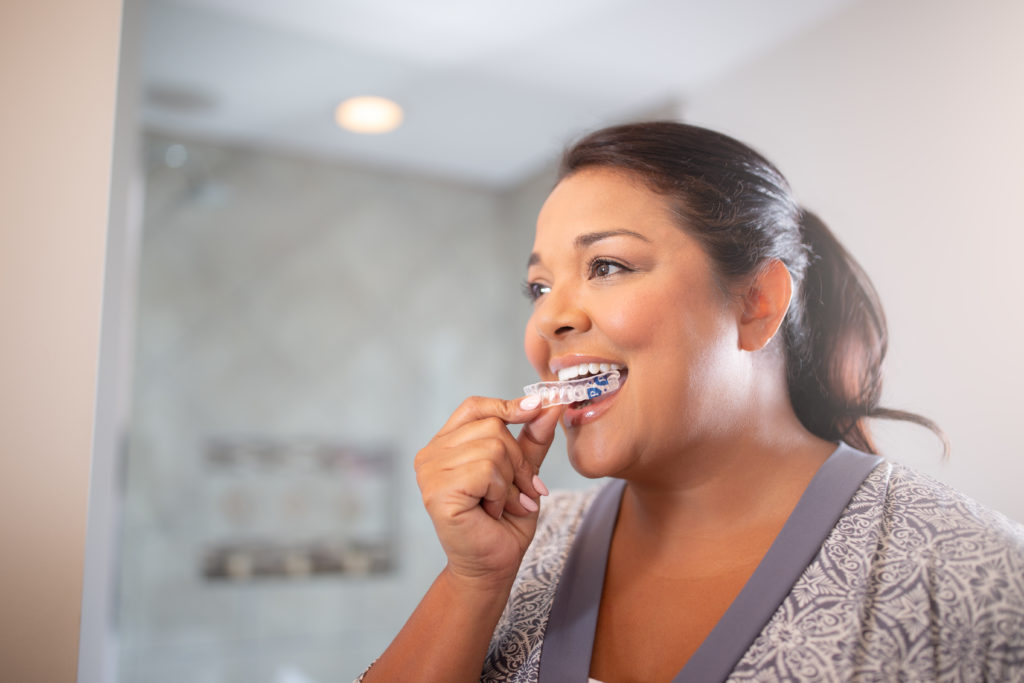
7:21 Sing songs, rinse, repeat
7:30 Dry off
7:32 Hair stuff, deodorize, clothe yourself, etc.
7:35 Pop out the trays, brush your teeth
7:45 Grab a bar and hit the door
See? It’s easy. You may not have even noticed how Perio Protect snuck right in there. But give it two weeks, and it’ll be a highly repeatable habit. You’ll experience, whiter teeth and fresher breath while you fend off gum disease-causing bacteria.
Talk to your dentist about how your can augment your routine and improve your overall health while addressing oral health.
Original content posted HERE – Read More about PerioProtect
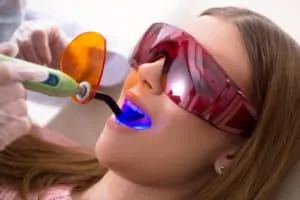
Why Do Fillings Fall Out?
Sometimes we put a lot of pressure on our teeth when we chew. This can cause a restoration to weaken and fall out. Also, as time wears on, your saliva can eat away at or loosen the bonding your Sparks dentist used to secure your filling. Sometimes the tooth that houses your restorative filling becomes subject to decay and deterioration. Other times fillings simply fall out because we bite down on something hard like a candy or popcorn kernel. Whatever the reason for your failing filling, be sure to have it fixed as soon as possible. Your tooth will be exposed to bacteria and unwanted food particles, causing sensitivity and even decay down the road.
What Should I Do Now?
First things first, give our Sparks dental office a call. If you’re unable to do that or get to the office right away, we have some tips to help you with your failed filling.
Tip #1 – If your filling didn’t fall out entirely or is loose, see if you can get it out — gently. If it stays in, there’s a chance you could swallow it or even choke.
Tip #2 – Your unfilled tooth is a welcoming environment for harmful bacteria to make a home and destroy your tooth. Be sure to brush gently and carefully. Rinse with water to make sure you’re removing any debris. Saltwater is great! Mix one cup of warm water, and one teaspoon of salt then rinse.
Tip #3 – Watch what you eat so that you don’t further damage your tooth. Avoid things that are sticky or hard. You don’t want anything getting stuck in your tooth or run the risk of breaking it when you bite. Keep foods simple and soft until you get a new filling.
Tip #4 – If you’re experiencing any sensitivity or pain, it’s usually OK to take over-the-counter pain medication to dull your discomfort. Try not to use any temporary dental cement to put your filling back in place. They tend to be messy, and you run the risk of further damaging your tooth.
What Will the Dentist Do?
One of the first things we’ll do when you come for a visit is to assess your damaged tooth thoroughly. We might even take some digital photos, too. We’ll use our training and cutting-edge technology to figure out what’s the best fit for your smile. If your tooth has not deteriorated or if it’s not severely decayed, we’ll be able to fix it with a new filling. Whatever treatment you need, take comfort in knowing you’re always in good hands at our dental office in Sparks.
We hope you learned a little something here today and that you’re able to get to the dentist soon. Failing or lost fillings are no fun! There’s no reason to panic though there’s a simple solution for every smile. We’re happy to be your dental partner and get your smile healthy and happy again!
